最新仁爱英语教学案例设计(教案)九年级上册(UNIT 4 Topic 3 SECTION A)
仁爱版九年级英语上册Unit4Topic3SectionC教学设计

3.重点:培养学生的口语表达能力,使其能够在情景对话中熟练运用所学知识。
难点:帮助学生克服口语表达中的恐惧感,提高语言表达的流畅性和准确性。
(二)教学设想
1.针对词汇和短语的学习,采用“词不离句,句不离篇”的教学方法。设计丰富的语境,让学生在实际语境中学习、运用词汇和短语,提高记忆效果。
5.整合教学资源,如图片、视频、音频等,丰富教学手段,提高学生的学习兴趣。
6.创设真实的语言环境,让学生在实际情境中运用所学知识,提高英语实践能力。
7.课后作业设计富有针对性和层次性,满足不同学生的学习需求,巩固课堂所学。
8.注重过程性评价,关注学生的课堂表现、作业完成情况以及参与度,全面评估学生的学习效果。
4.口语表达能力方面,学生在进行情景对话时,有时会出现语言表达不流畅、不准确的现象,教师应多给予鼓励和指导,提高学生的自信心和表达能力。
5.在情感态度与价值观方面,九年级学生正处于青春期,具有较强的求知欲和好奇心,教师应充分挖掘教材中的德育因素,引导学生形成正确的价值观。
针对以上学情,教师应结合学生的实际情况,调整教学策略,关注个体差异,以提高本章节的教学效果。
2.对于被动语态的教学,通过对比、归纳、总结的方式,帮助学生掌握语法规则。结合文本中的例句,让学生在具体语境中感受被动语态的用法。
3.阅读教学中,采用“预测-阅读-验证”的教学模式,引导学生运用阅读策略,提高阅读效率。同时,设计问题链,引导学生深入理解文本,培养阅读素养。
4.口语表达训练中,采用角色扮演、小组讨论等形式,激发学生的表达欲望。注重个体差异,给予每个学生充分的表达机会,提高口语表达能力。
设计意图:通过角色扮演,让学生在实际情境中运用所学知识,提高口语表达能力。
仁爱版九年级英语上册Unit4Topic3SectionA优秀教学案例
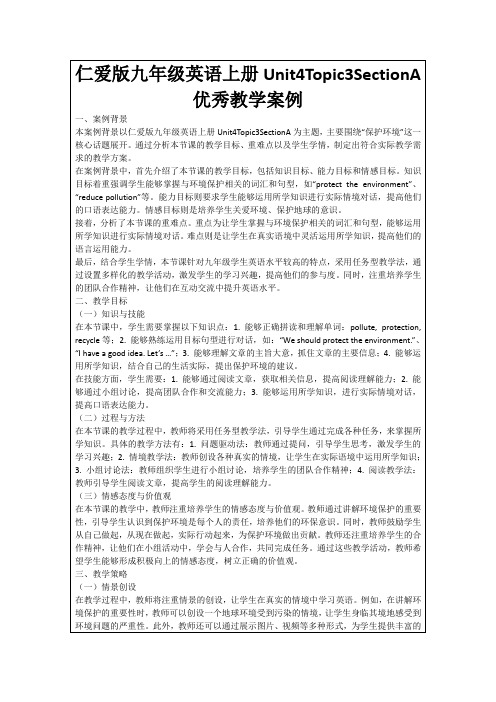
4.情感态度与价值观的培养
本节课不仅注重知识的传授,还注重培养学生的情感态度与价值观。教师通过讲解环境保护的重要性,引导学生认识到保护环境是每个人的责任。学生在这个过程中,逐渐形成了关爱环境、保护地球的意识。
5.多样化的教学评价,全面提高学生能力
本节课的教学评价方式多样化,包括学生的小组讨论、演讲视频等。这些评价方式不仅能够检验学生对知识的掌握程度,还能够提高学生的写作和口语表达能力。教师通过这些评价方式,全面了解学生的学习情况,为下一步的教学提供有力支持。
(四)反思与评价
在教学过程中,教师将注重学生的反思与评价。教师会定期让学生对自己的学习进行反思,思考自己在学习过程中的优点和不足,并提出改进措施。此外,教师还会对学生的学习成果进行评价,给予肯定和鼓励,激发他们的学习动力。
四、教学内容与过程
(一)导入新课
在导入新课时,教师可以通过展示一张地球的照片,让学生观察地球的美景,然后提出问题:“你们认为地球是什么颜色的?”学生可能会回答:“蓝色、绿色、白色等。”教师接着提问:“为什么地球会呈现这些颜色?”学生可能会回答:“因为地球上有水、植物、大气等。”教师趁机引出本节课的主题:“保护环境”,并告诉学生:“今天我们将学习如何保护这个美丽的地球。”
(三)学生小组讨论
在学生小组讨论环节,教师可以将学生分成若干小组,每组学生根据所学知识,讨论并提出自己的环保建议。例如,第一组学生提出减少使用一次性塑料的建议,第二组学生提出节约用水用电的建议,以此类推。学生可以通过绘制海报、制作PPT等形式,展示自己的建议。
(四)总结归纳
在总结归纳环节,教师可以邀请各小组的代表上台分享自己的建议,并让学生进行投票,选出最受欢迎的环保建议。教师趁机引导学生认识到保护环境的重要性,并鼓励他们从自己做起,实际行动起来。
仁爱版九年级上册英语优秀教学案例:Unit4Topic3SectionD

四、教学பைடு நூலகம்容与过程
(一)导入新课
1.利用多媒体展示一些与环境问题相关的图片或视频,如污染严重的河流、垃圾堆积如山的垃圾场等,引发学生的思考,激发他们的学习兴趣。
2.向学生提问:“你们对环境问题有什么看法?”“你们认为我们可以采取哪些措施来保护环境?”等,引导学生积极参与课堂讨论,为新课的学习做好铺垫。
仁爱版九年级上册英语优秀教学案例:Unit4Topic3SectionD
一、案例背景
本案例背景以仁爱版九年级上册英语Unit4Topic3SectionD为例,本节课主要讨论了关于环境保护的话题。通过前面的学习,学生已经掌握了与环境相关的词汇和表达方式,并能在适当的情境中运用。本节课旨在帮助学生进一步了解环境问题的严重性,提高他们的环保意识,并能够运用所学知识提出一些合理的环保建议。
(三)小组合作
1.按照学生的特点和能力,将他们分成不同的小组,并进行合理的分工,使每个学生都能在小组合作中发挥自己的优势。
2.设计一些小组合作活动,如讨论、调查、报告等,让学生在合作中交流、讨论和分享,提高他们的团队合作能力和交流沟通能力。
3.在小组合作活动中,教师要进行巡回指导,关注每个学生的学习情况,及时给予他们帮助和指导。
(二)过程与方法
1.通过小组合作学习,培养学生的团队合作能力和交流沟通能力。
2.利用多媒体教学资源,如视频、图片等,激发学生的学习兴趣,提高他们的视觉和听觉学习能力。
3.通过情景模拟和角色扮演等教学活动,让学生在实际语境中运用所学知识,提高他们的实际操作能力和应用能力。
4.引导学生进行自主学习,培养他们的自主学习能力,使他们能够在教师的指导下,独立地获取和处理信息。
最新仁爱版九年级上册英语教学案Unit4Topic3SectionA

最新教学资料·仁爱版英语Topic 3 China is the third nation that sent a person into space.Section AⅠ. Material analysis本课是九年级第四单元第三话题的第一课时。
主活动是1a和2。
1a通过Michael与Kangkang参观科技博物馆时的对话引出话题:中国航天事业的发展。
除了引出话题,还引出了语法:定语从句。
1b 属于简单的听音找词训练,主要是训练学生听取特定信息的能力。
1c 过渡到对1a的理解,是考查学生的阅读能力。
2是为了突破本课的语法,让学生通过观察来习得语法知识,而不是通过老师填鸭式的灌输。
3这个听力任务,从内容上讲,还是在介绍中国的航天知识,但是目的是训练学生的听写技能,尤其是速记技能。
4既兼顾了语法,又把学生的视野扩展到世界范围。
阿姆斯特朗在月球上的一小步,却是人类探索宇宙的一大步。
培养学生科技无国界的科学理念。
Ⅱ.Teaching aims1. Knowledge aims:掌握本课的重点词汇和短语,初步学习定语从句。
2. Skill aims:能够在听1a的长对话时,准确地判断1b中特定的词或词组。
能够在2的示例下,举一反三,正确地运用关系代词连接句子。
能够在3的听写任务中,运用速记完成表格。
3. Emotional aims: (optional)培养祖国意识,扩展国际视野。
4. Culture awareness: (optional)Ⅲ. The key points and difficult points1. Key points:Words and phrases: prove, legend, landmark, send …into…, in the past few years, make great progress in, set foot on, along with, spend …doing sth.Sentences: He is our national hero who traveled around the earth in Shenzhou V for 21 hours in 2003.China is the third nation that sent a person into space.It’s a spaceship which was launched as China’s first lunar probe.I hope I can travel to the moon one day.Grammar: Attributive clause2. Difficult points:理解定语从句的关系代词所代表的意义。
仁爱版九年级英语上册Unit 4 Topic 3 Section B教案

Unit 4 Amazing ScienceTopic 3 Section B教案Teaching aims and demands1. Learn some new words: technology, master, introduction, expect.2. Learn the usage of object complement:A. So I advise you to study harder to make computers serve our lives better.B. Astronauts add water to dried food to make it wet so that no pieces of food will fly around and influence the spaceship’s controls.3. Learn something more about our astronauts’ life during their space trip.4. Develop the students’ patriotic spirit.Teaching aids卡片/小黑板/录音机/图片Teaching PlanStep 1 Review做游戏,复习上节课内容,教师手中拿有很多带有问题的卡片,把全班分成四组,每组选出一名代表来抽取卡片递给教师,然后把问题提出来,看哪个组答的又快又准确。
T: Let’s play a game. I’ll divide the whole class into four groups. Each group need to choose one student to pick up the card. And he or she will read the questions, then others answer. Which group can answer these questions fastest and most exactly is the winner. Are you ready? Students: OK.T: Now let’s begin.学生抽取纸条,一一抽取问题如下:(1)Who is the first space traveller of China?(2)Which spaceship did Yang Liwei take?(3)When did Yang Liwei go into space?(4)How long did Yang Liwei stay there?教师总结,引出新话题,导入生词。
仁爱版英语九年级上册Unit4Topic3ChinaisthethirdnationSectionD
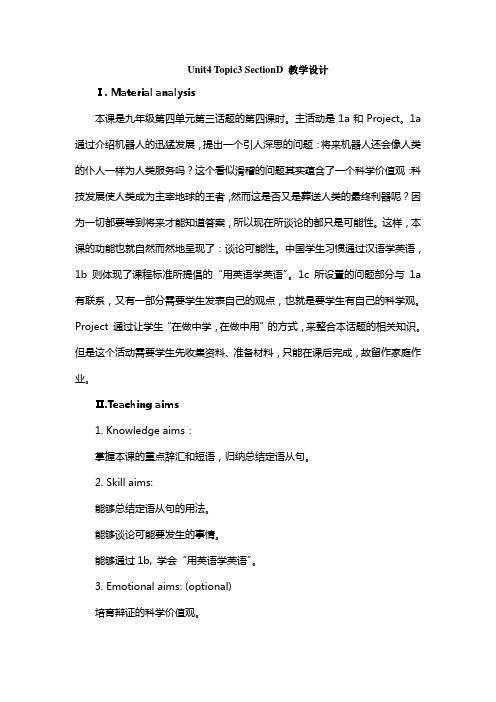
Unit4 Topic3 SectionD 教学设计Ⅰ. Material analysis本课是九年级第四单元第三话题的第四课时。
主活动是1a和Project。
1a 通过介绍机器人的迅猛发展,提出一个引人深思的问题:将来机器人还会像人类的仆人一样为人类服务吗?这个看似滑稽的问题其实蕴含了一个科学价值观:科技发展使人类成为主宰地球的王者,然而这是否又是葬送人类的最终利器呢?因为一切都要等到将来才能知道答案,所以现在所谈论的都只是可能性。
这样,本课的功能也就自然而然地呈现了:谈论可能性。
中国学生习惯通过汉语学英语,1b则体现了课程标准所提倡的“用英语学英语”。
1c 所设置的问题部分与1a 有联系,又有一部分需要学生发表自己的观点,也就是要学生有自己的科学观。
Project 通过让学生“在做中学,在做中用”的方式,来整合本话题的相关知识。
但是这个活动需要学生先收集资料、准备材料,只能在课后完成,故留作家庭作业。
Ⅱ.Teaching aims1. Knowledge aims:掌握本课的重点辞汇和短语,归纳总结定语从句。
2. Skill aims:能够总结定语从句的用法。
能够谈论可能要发生的事情。
能够通过1b, 学会“用英语学英语”。
3. Emotional aims: (optional)培育辩证的科学价值观。
4. Culture awareness: (optional)Ⅲ. The key points and difficult points1. Key points:Words and phrases: certain, for certain, on one’s own, warn, might, housework, so far, be surprised at, no longerSentences: No one knows for certain, but most people think that robots will be part of our lives.In a few years, perhaps robots will think on their own, just as people use their brains and act for themselves.One scientist warns that if robots start to think for themselves, they will no longer want to be our servants, but our masters.Grammar: summarize the attributive clause, talk about possibilities2. Difficult points:The scientist also warns that if we are lucky, they might treat us as we now treat our pets.Perhaps there will be a war between human beings and robots.In a few years, perhaps robots will think on their own, just as people use their brains and act for themselves.However, once robots can think for themselves, problems may appear.Ⅳ. Learning strategies在“语法和功能”部份,通过和老师同学一起总结定语从句的用法,来整理本话题的语法。
Unit 4Topic3 SectionC教案 仁爱版九年级英语上册
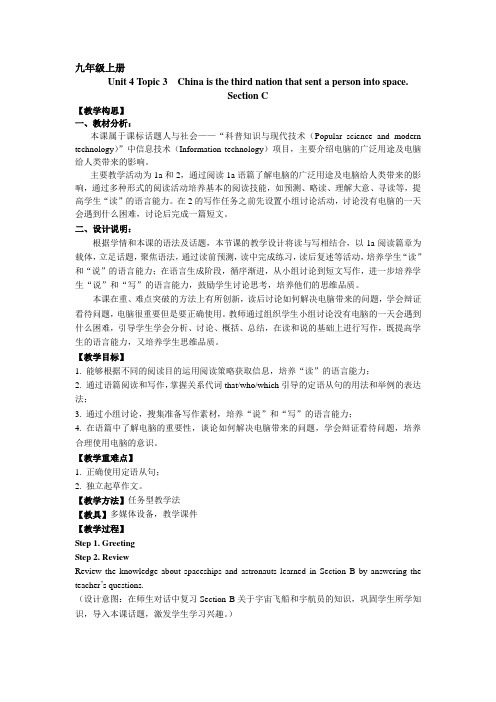
九年级上册Unit 4 Topic 3 China is the third nation that sent a person into space.Section C【教学构思】一、教材分析:本课属于课标话题人与社会——“科普知识与现代技术(Popular science and modern technology)”中信息技术(Information technology)项目,主要介绍电脑的广泛用途及电脑给人类带来的影响。
主要教学活动为1a和2,通过阅读1a语篇了解电脑的广泛用途及电脑给人类带来的影响,通过多种形式的阅读活动培养基本的阅读技能,如预测、略读、理解大意、寻读等,提高学生“读”的语言能力。
在2的写作任务之前先设置小组讨论活动,讨论没有电脑的一天会遇到什么困难,讨论后完成一篇短文。
二、设计说明:根据学情和本课的语法及话题,本节课的教学设计将读与写相结合,以1a阅读篇章为载体,立足话题,聚焦语法,通过读前预测,读中完成练习,读后复述等活动,培养学生“读”和“说”的语言能力;在语言生成阶段,循序渐进,从小组讨论到短文写作,进一步培养学生“说”和“写”的语言能力,鼓励学生讨论思考,培养他们的思维品质。
本课在重、难点突破的方法上有所创新,读后讨论如何解决电脑带来的问题,学会辩证看待问题,电脑很重要但是要正确使用。
教师通过组织学生小组讨论没有电脑的一天会遇到什么困难,引导学生学会分析、讨论、概括、总结,在读和说的基础上进行写作,既提高学生的语言能力,又培养学生思维品质。
【教学目标】1. 能够根据不同的阅读目的运用阅读策略获取信息,培养“读”的语言能力;2. 通过语篇阅读和写作,掌握关系代词that/who/which引导的定语从句的用法和举例的表达法;3. 通过小组讨论,搜集准备写作素材,培养“说”和“写”的语言能力;4. 在语篇中了解电脑的重要性,谈论如何解决电脑带来的问题,学会辩证看待问题,培养合理使用电脑的意识。
仁爱版英语九年级上册Unit4 Topic 3 Section 教学设计与反思
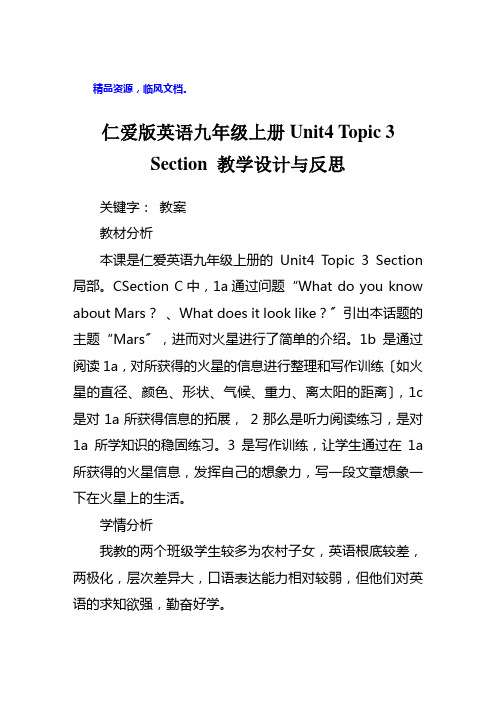
精品资源,临风文档。
仁爱版英语九年级上册Unit4 Topic 3Section 教学设计与反思关键字:教案教材分析本课是仁爱英语九年级上册的Unit4 Topic 3 Section 局部。
CSection C中,1a通过问题“What do you know about Mars?、What does it look like?〞引出本话题的主题“Mars〞,进而对火星进行了简单的介绍。
1b是通过阅读1a,对所获得的火星的信息进行整理和写作训练〔如火星的直径、颜色、形状、气候、重力、离太阳的距离〕,1c 是对1a所获得信息的拓展,2那么是听力阅读练习,是对1a所学知识的稳固练习。
3是写作训练,让学生通过在1a 所获得的火星信息,发挥自己的想象力,写一段文章想象一下在火星上的生活。
学情分析我教的两个班级学生较多为农村子女,英语根底较差,两极化,层次差异大,口语表达能力相对较弱,但他们对英语的求知欲强,勤奋好学。
教学目标1、语法:继续学习含有情态动词的被动语态。
了解更多关于火星的知识。
2、语言技能:能听懂关于火星的文章,并从中获取有效信息。
能用简单的语言谈论火星,能读懂关于科技方面的文段。
3、情感态度:培养学生[ ]热爱科学、积极探索的学习态度及与别人的合作精神。
教学重点和难点重点:掌握新单词的根底上了解课文大意。
难点:继续学习含有情态动词的被动语态。
教学过程(本文Step 1 Review1Ask some questions.2. 通过嫦娥奔月的图片,引起学生对太空的遐想。
呈现新课。
3.稳固课文:.Let Ss r the text according to the following words and phases4.Test in class5.Homework:Write a passage about life on Mars according to what you know about it.1 Answer the questions.2.students Listen to la and answer the following questions, then check the answers.3 Let Ss master the sces in 2.4.Students work in groups1.通过习题练复习情态动词的被态。
仁爱版九上英语教案:Unit 4 Topic 3 Section C
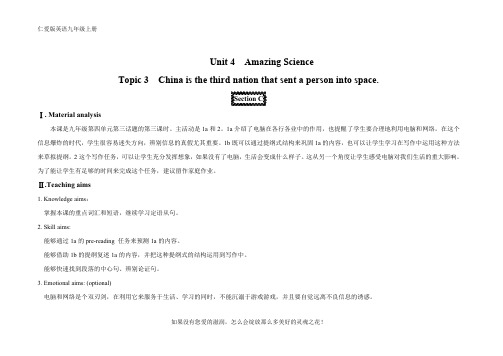
Unit 4 Amazing ScienceTopic 3 China is the third nation that sent a person into space.Section CⅠ. Material analysis本课是九年级第四单元第三话题的第三课时。
主活动是1a和2。
1a介绍了电脑在各行各业中的作用,也提醒了学生要合理地利用电脑和网络。
在这个信息爆炸的时代,学生很容易迷失方向,辨别信息的真假尤其重要。
1b既可以通过提纲式结构来巩固1a的内容,也可以让学生学习在写作中运用这种方法来草拟提纲。
2这个写作任务,可以让学生充分发挥想象,如果没有了电脑,生活会变成什么样子。
这从另一个角度让学生感受电脑对我们生活的重大影响。
为了能让学生有足够的时间来完成这个任务,建议留作家庭作业。
Ⅱ.Teaching aims1. Knowledge aims:掌握本课的重点词汇和短语,继续学习定语从句。
2. Skill aims:能够通过1a的pre-reading 任务来预测1a的内容。
能够借助1b的提纲复述1a的内容,并把这种提纲式的结构运用到写作中。
能够快速找到段落的中心句、辨别论证句。
3. Emotional aims: (optional)电脑和网络是个双刃剑,在利用它来服务于生活、学习的同时,不能沉溺于游戏游戏,并且要自觉远离不良信息的诱惑。
如果没有您爱的滋润,怎么会绽放那么多美好的灵魂之花!Ⅲ. The key points and difficult points1. Key points:Words and phrases: doubt, tiny, inside, brain, cancel, connect, no doubt, normally, for instance, besides, properly, be useful in,with the help of, for example, keep sth/sb. doing, place orders, thanks to, come into being, instead of doing sth.Sentences: There is no doubt that computers are very useful in technology and business.For example, tiny computers which are inside patients’ bodies can keep their hearts beating normally.In factories, robots are controlled by computers that are like human brains.Grammar: Attributive clause2. Difficult points:In space, computers have been used to control the speed and direction of a spaceship.Besides, not everything we read on the Internet is true or good for us.Computers help us at work and at home, but they must be used properly.Ⅳ. Learning strategies通过标志词,如:for instance, for example, besides来找到属于举例子的句子。
仁爱版英语九年级上册Unit4 Topic3 SectionA 教学设计

Unit4 Topic3 SectionA 教学设计Ⅰ. Material analysis本课是九年级第四单元第三话题的第一课时。
主活动是1a和2。
1a通过Michael与Kangkang参观科技博物馆时的对话引出话题:中国航天事业的发展。
除了引出话题,还引出了语法:定语从句。
1b 属于简单的听音找词训练,主要是训练学生听取特定信息的能力。
1c 过渡到对1a的理解,是考查学生的阅读能力。
2是为了突破本课的语法,让学生通过观察来习得语法知识,而不是通过老师填鸭式的灌输。
3这个听力任务,从内容上讲,还是在介绍中国的航天知识,但是目的是训练学生的听写技能,尤其是速记技能。
4既兼顾了语法,又把学生的视野扩展到世界范围。
阿姆斯特朗在月球上的一小步,却是人类探索宇宙的一大步。
培养学生科技无国界的科学理念。
Ⅱ.Teaching aims1. Knowledge aims:掌握本课的重点词汇和短语,初步学习定语从句。
2. Skill aims:能够在听1a的长对话时,准确地判断1b中特定的词或词组。
能够在2的示例下,举一反三,正确地运用关系代词连接句子。
能够在3的听写任务中,运用速记完成表格。
3. Emotional aims: (optional)培养祖国意识,扩展国际视野。
4. Culture awareness: (optional)Ⅲ. The key points and difficult points1. Key points:Words and phrases: prove, legend, landmark, send …into…, in the past few years,make great progress in, set foot on, along with, spend …doingsth.Sentences: He is our national hero who traveled around the earth in Shenzhou V for 21 hours in 2003.China is the third nation that sent a person into space.It’s a spaceship which was launched as China’s first lunar probe.1 / 9I hope I can travel to the moon one day.Grammar: Attributive clause2. Difficult points:理解定语从句的关系代词所代表的意义。
Unit4Topic3教案2023-2024学年仁爱版九年级英语上册
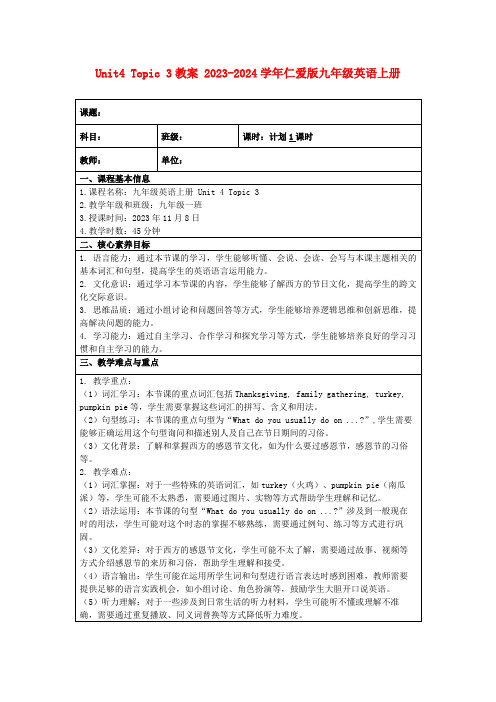
九、作业评价
1. 作业布置:根据本节课的教学内容和目标,为学生布置相关的作业,如写一篇关于感恩节的作文、制作感恩节的卡片等。作业的难度和数量要适中,以便学生能够顺利完成。
3. 重点难点解析:在讲授过程中,我会特别强调感恩节的文化背景和庆祝方式这两个重点。对于文化背景部分,我会通过讲述感恩节的来历和传统习俗来帮助大家理解。
三、实践活动(用时10分钟)
1. 分组讨论:学生们将分成若干小组,每组讨论一个与感恩节相关的实际问题,如“如何向家人表达感激之情?”
2. 角色扮演:为了加深理解,我们将进行一个角色扮演活动。学生们将扮演不同角色,如家人、朋友,通过对话和互动来展示感恩的情景。
3. 实验器材:本节课不涉及实验内容,无需准备实验器材。
4. 教室布置:根据教学需要,将教室布置成小组讨论区和实验操作区,以便于学生进行小组讨论和实验操作。
5. 教学工具:准备投影仪、计算机、音响等教学工具,以便于教师进行多媒体教学和听力训练。
6. 学习资料:准备与本节课相关的学习资料,如感恩节的习俗的介绍、感恩节的美食的图片等,以提供给学生进行自主学习和探究学习。
2. 文化意识:通过学习本节课的内容,学生能够了解西方的节日文化,提高学生的跨文化交际意识。
3. 思维品质:通过小组讨论和问题回答等方式,学生能够培养逻辑思维和创新思维,提高解决问题的能力。
4. 学习能力:通过自主学习、合作学习和探究学习等方式,学生能够培养良好的学习习惯和自主学习的能力。
三、教学难点与重点
仁爱版九年级英语上册Unit 4 Amazing Science Topic 3 Section C 教案
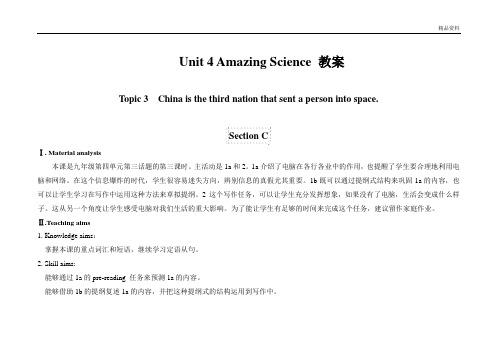
Unit 4 Amazing Science 教案Topic 3 China is the third nation that sent a person into space.Section CⅠ. Material analysis本课是九年级第四单元第三话题的第三课时。
主活动是1a和2。
1a介绍了电脑在各行各业中的作用,也提醒了学生要合理地利用电脑和网络。
在这个信息爆炸的时代,学生很容易迷失方向,辨别信息的真假尤其重要。
1b既可以通过提纲式结构来巩固1a的内容,也可以让学生学习在写作中运用这种方法来草拟提纲。
2这个写作任务,可以让学生充分发挥想象,如果没有了电脑,生活会变成什么样子。
这从另一个角度让学生感受电脑对我们生活的重大影响。
为了能让学生有足够的时间来完成这个任务,建议留作家庭作业。
Ⅱ.Teaching aims1. Knowledge aims:掌握本课的重点词汇和短语,继续学习定语从句。
2. Skill aims:能够通过1a的pre-reading 任务来预测1a的内容。
能够借助1b的提纲复述1a的内容,并把这种提纲式的结构运用到写作中。
能够快速找到段落的中心句、辨别论证句。
3. Emotional aims: (optional)电脑和网络是个双刃剑,在利用它来服务于生活、学习的同时,不能沉溺于游戏游戏,并且要自觉远离不良信息的诱惑。
Ⅲ. The key points and difficult points1. Key points:Words and phrases: doubt, tiny, inside, brain, cancel, connect, no doubt, normally, for instance, besides, properly, be useful in,with the help of, for example, keep sth/sb. doing, place orders, thanks to, come into being, instead of doing sth.Sentences: There is no doubt that computers are very useful in technology and business.For example, tiny computers which are inside patients’ bodies can keep their hearts beating normally.In factories, robots are controlled by computers that are like human brains.Grammar: Attributive clause2. Difficult points:In space, computers have been used to control the speed and direction of a spaceship.Besides, not everything we read on the Internet is true or good for us.Computers help us at work and at home, but they must be used properly.Ⅳ. Learning strategies通过标志词,如:for instance, for example, besides来找到属于举例子的句子。
仁爱英语九年级unit4topic3学案教案
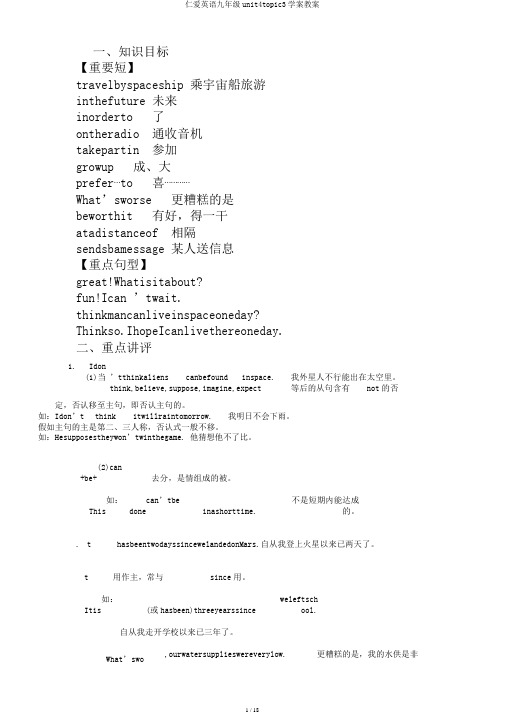
一、知识目标【重要短】travelbyspaceship 乘宇宙船旅游inthefuture 未来inorderto 了ontheradio 通收音机takepartin 参加growup 成、大prefer⋯to 喜⋯⋯⋯⋯What’sworse更糟糕的是beworthit 有好,得一干atadistanceof 相隔sendsbamessage 某人送信息【重点句型】great!Whatisitabout?fun!Ican ’twait. thinkmancanliveinspaceoneday? Thinkso.IhopeIcanlivethereoneday.二、重点讲评1. Idon(1)当’tthink aliens canbefound inspace.think,believe,suppose,imagine,expect 我外星人不行能出在太空里。
等后的从句含有not的否定,否认移至主句,即否认主句的。
如:Idon’t think itwillraintomorrow. 我明日不会下雨。
假如主句的主是第二、三人称,否认式一般不移。
如:Hesupposestheywon’twinthegame.他猜想他不了比。
(2)can+be+去分,是情组成的被。
如:Thiscan’tbedone inashorttime.不是短期内能达成的。
.t hasbeentwodayssincewelandedonMars.自从我登上火星以来已两天了。
it用作主,常与since用。
如:Itis(或hasbeen)threeyearssince weleftschool.自从我走开学校以来已三年了。
What’swo,ourwatersupplieswereverylow.更糟糕的是,我的水供是非.rse常有限的。
What’sworse更糟糕的是。
似构有:What’smore更有甚者;更重要的是。
.t’saquarterasbigastheearth..它是地球的四分之一大。
【仁爱版】市优质资源评比优秀作品九年级上册Unit4Topic3SD教案

I know the boy who/that you are looking for.
用括号内所给词的正确形式填空
1. Itproves(prove) that China has made great progress in its space industry.
通过学习单词,学生能熟练说出并能进行英汉互译。
1.on one’s own = by oneself =alone
2.certain adj.------
1a中的要点。使学生了解未来机器人对人类的利和弊,如何谈论事物的有利因素和不利因素。
People are ________ at the rapid development ofrobots. In a few years, perhaps robots will think on _______ own, just as people use their brains and act for themselves. However, once robots can think for themselves, problems may appear. One scientist _____ that if robots start to think for themselves, they will no _______want to be our servants, but our masters. They _______ treat us as we now treat our pets.
Mary bought a little bird that/which was very pretty.
英语: Unit4 Topic3 Section C 教学设计(仁爱版九上)

一、教材:仁爱英语9年级上Unit4 Topic3 Section C二、教具:录音机、图片等三、教学方法:合作探究式四、教学目标:A.认知目标:通过学习本单元有关太空的知识,设想人类未来居住的话题。
掌握本单元的主要单词、词组和主要句型,及含有情态动词的被动语态用法。
能在听、说、读、写活动中准确地运用。
B.能力目标:培养学生良好的复习习惯,提高学生的听、说、读、写方面的能力,能从口头上用英语流利地介绍有关火星的知识。
同时培养学生的知识迁移运用能力,进一步巩固所学的知识。
C.情感目标:关注学生的学习态度,尊重学生的学习经验,发展并保持学习英语的兴趣。
培养学生养成热爱观察,热爱生活,探索未知的勇气,培养学生合作学习的精神。
五、教学重、难点1. Learn the new words and phrases2. Review the passive voice.3. Learn something more about Mars.六、五指教学方法七、教学过程Step 1 Revision1. Check the exercises.2. Revise the words and phrases.Step 2 Presentation1. Listen and answer the questions.Q1. What does it look like? ( It looks like a red and orange ball. )2. Can people live there easily? ( No, they can’t. )2. Read 1a. Find out the difficulties and important words and expressions.3. Ask some students write down the Keys on the Bb.Step 3 Consolidation1. Please retell the passage according to the key words on the blackboard.2. (完成1b练习。
- 1、下载文档前请自行甄别文档内容的完整性,平台不提供额外的编辑、内容补充、找答案等附加服务。
- 2、"仅部分预览"的文档,不可在线预览部分如存在完整性等问题,可反馈申请退款(可完整预览的文档不适用该条件!)。
- 3、如文档侵犯您的权益,请联系客服反馈,我们会尽快为您处理(人工客服工作时间:9:00-18:30)。
仁爱英语教案Unit 4 Amazing Science Topic 3 I don’t think aliens can be found in space.Section AThe main activities are 1a and 2a. 本课重点活动是1a和2a。
Ⅰ. Teaching aims and demands 教学目标1. Learn a new word:research2. Learn some useful sentences:(1) What fun!(2) I won’t believe there are aliens until I see them with my own eyes.3. Learn the use of modal verb+be+P.P.:(1) We will be able to do anything that can be done on the earth.(2) But I don’t think aliens can be found in space.4. Talk about flying to Mars, the outer space and something about the aliens.5. Learn expressing possibility and impossibility.Ⅱ. Teaching aids 教具关键词卡片/图片/录音机/小黑板Ⅲ. Five-finger Teaching Plan 五指教学方案Step 1 Review 第一步复习(时间:8分钟)复习巩固本单元Topic 2中所学重点句型和语法,提高学生综合语言运用能力。
1. (复习巩固前面学过的有关现代科技及发明的重点句型,提高学生的口语表达能力。
) T: Boys and girls, we have learned something about spaceships, satellites, cloning, robots, GPS and so on. The new technologies and inventions have improved our life greatly. Could you say something about them?Ss: Yes.T: OK. I made some cards with some key words on them. Each of you tries to say a sentence with the key words. Are you clear?Ss: Yes.T: OK, begin!(出示写有关键词的卡片。
)(1) proved, made great progress, developing, space industryS1: They have proved that China has made great progress in developing its space industry. (2) spaceships, controlled, computersS2: Spaceships are mainly controlled by computers.…2. (复习一般过去时的被动语态,导入新课,并呈现生词research。
)(出示神五及嫦娥一号的图片。
)T: When was ShenzhouⅤlaunched, S3?S3: It was launched in 2003.T: When was Chang’eⅠlaunched, S4?S4: It was launched in 2007.T: Well done! They have proved that China has made great progress in developing its space industry. Is it right, S5?S5: That’s right. I’m sure we’ll send more spaceships into space.T: Of course we can. Maybe people will fly to Mars one day. Do you think it is magical?Ss: Yes, that’s very exciting.T: Do you want to be an astronaut like Yang Liwei?S6: Yes. I hope that I can travel to the moon one day.…T: Boys and girls, if you can be an astronaut in the future, you can do more research about space.But you should study hard now to make your dreams come true.(板书并要求学生掌握。
)researchStep 2 Presentation 第二步呈现(时间:12分钟)呈现1a,完成1b。
培养学生的听说技能和阅读理解能力。
1. (让学生听1a前讨论,以加深理解。
)T: Boys and girls, I will ask you two questions before listening. Please discuss them in two minutes.(1) Do you think people will live on Mars in the future?(2) Do you believe there are aliens in space?(两分钟后,播放1a录音,让学生带着问题听, 培养学生听力技能。
)T: OK. Let’s listen to the dialog and answer the questions on the small blackboard.(出示小黑板。
)(1) What are they going to do this Saturday evening?(2) What’s the movie about?(3) What can people do on Mars in that movie?T: Boys and girls, can you answer the questions?(核对答案。
)2. (将学生分成两大组朗读1a,让学生画出关键词,再读一遍1a,完成1b。
)T: Open your books. Girls act as Maria. Boys act as Kangkang. Read the dialog. After reading, find out the key words and phrases in it. Read it again and finish 1b.(板书)movie, life in space, exciting, travel, visit, do you think, live in space, houses, schools,hospitals, be able to do, wait(核对1b的答案。
)3. (让学生找出对话中的新语法modal verb + be + P.P.,教师进行讲解并操练。
)T: We have learned “is/am/are+P.P.” and “was/were+P.P.” Please find out sentences with modal verb + be + P.P.(教师板书并解释带有情态动词的被动语态结构。
)We will be able to do anything that can be done on the earth.modal verb+be+P.P.(教师强调带有情态动词的被动语态结构并操练。
)T: Boys and girls, I’ll say a sentence in the active voice. You change it into the passive voice, OK?Ss: OK.T: We should clean our classroom every day.Ss: Our classroom should be cleaned by us every day.T: We must finish our homework on time.Ss: Our homework must be finished on time.T: I may put my book in your bag.Ss: My book may be put in your bag.T: Excellent. You did a good job.Step 3 Consolidation 第三步巩固(时间:9分钟)巩固1a,呈现并完成2a和2b。
进一步培养学生的听说技能和阅读理解能力。
1. (让学生表演1a。
)T: Boys and girls, can you act out the dialog?Ss: Yes.(学生表演后,教师给予鼓励。
)2. (放2a录音,让学生带着问题去听。
)T: We know Maria and Kangkang saw a wonderful movie about life in space. After seeing the movie, what are they talking about? Now let’s listen to the tape and answer the questions on the small blackboard.(出示小黑板。
解释生词并要求学生理解。
)(1) What are they talking about?(2) How about the scientific research on aliens in America?(核对答案。
)(板书并要求学生理解。
)scientific3. (分组朗读2a,完成2b。
)T: Boys act as Kangkang. Girls act as Maria. Please read the dialog aloud. After reading, please finish 2b.(核对答案。
)4. (让学生再读对话,找出文中的难点,老师进行讲解。
